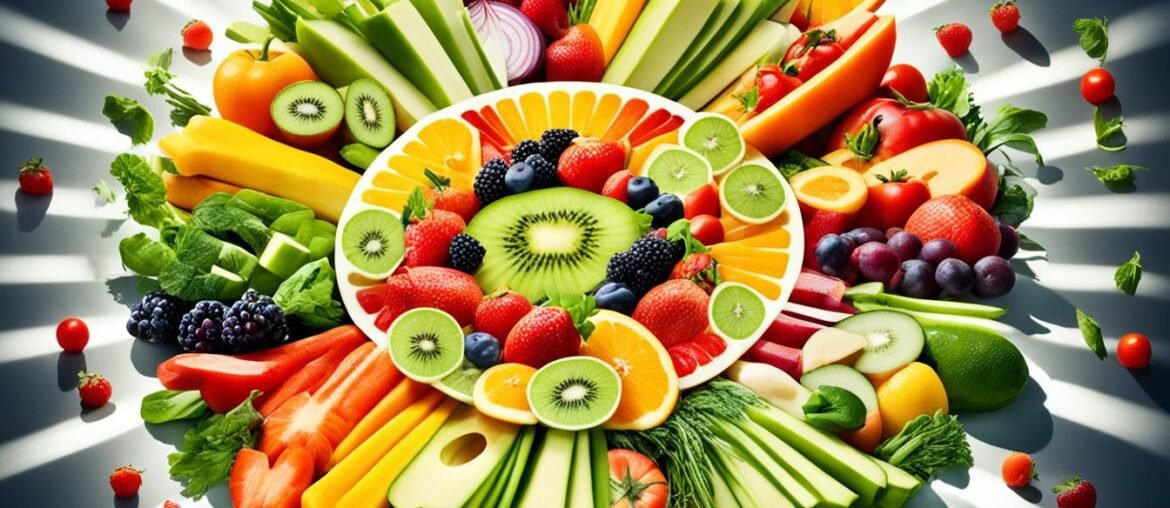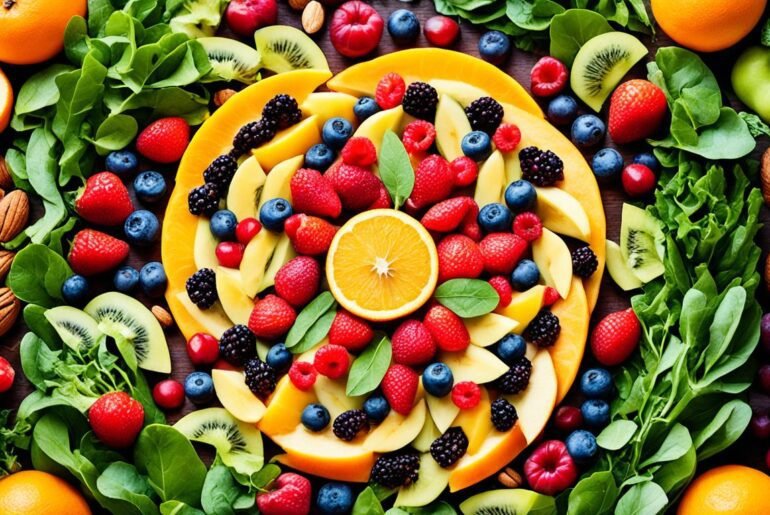Did you know that the food you eat can directly impact the aging process of your skin? A natural diet filled with skin-healthy foods can help rejuvenate and nourish your skin, keeping it youthful and radiant.
As we age, our skin undergoes changes that can lead to wrinkles, sagging, and dullness. However, by incorporating the right nutrients into our diet, we can support our skin’s health and fight against the signs of aging.
This article explores the power of a natural diet in promoting skin anti-aging and reveals 10 of the best foods that can help you achieve youthful and glowing skin.
Key Takeaways:
- A natural diet plays a crucial role in skin anti-aging and rejuvenation.
- Certain foods are rich in anti-aging nutrients that nourish the skin.
- A skin-friendly diet can help protect against oxidative stress, a major cause of skin aging.
- Broccoli, red bell pepper, spinach, sweet potatoes, watercress, avocado, blueberries, and papaya are some of the best foods for promoting youthful skin.
- Incorporating these foods into your diet can support healthy aging and overall well-being.
Broccoli: A Powerhouse for Skin Anti-Aging
Broccoli is an aging-support powerhouse that can greatly contribute to skin rejuvenation. Packed with essential nutrients, antioxidants, and vitamins, this vibrant green vegetable provides numerous benefits for promoting healthy and youthful skin.
One of the key components of broccoli is its high concentration of vitamin C, a potent antioxidant that helps fight free radicals and combat the signs of aging. Vitamin C is crucial for collagen production, which is essential for maintaining the skin’s elasticity and firmness. By incorporating broccoli into your diet, you can support collagen synthesis and promote a more youthful appearance.
“Broccoli is a true superfood for your skin. Its abundance of antioxidants and vitamin C can substantially contribute to skin rejuvenation and overall skin health.”
In addition to vitamin C, broccoli is also rich in vitamin K, which plays a vital role in promoting skin health. Vitamin K helps reduce inflammation and can even help diminish the appearance of dark circles under the eyes.
Broccoli’s antioxidant properties help protect the skin from environmental damage and oxidative stress, which are known to accelerate the aging process. Antioxidants combat free radicals, which can lead to wrinkles, fine lines, and other signs of aging.
Furthermore, broccoli contains other essential nutrients such as fiber, folate, lutein, and calcium. These nutrients support overall health and well-being, making broccoli a valuable addition to any diet.
Whether steamed, sautéed, or enjoyed raw, broccoli is a versatile vegetable that can be easily incorporated into various dishes. Its vibrant green color adds a visually appealing element to any meal.
Adding broccoli to your regular diet can significantly contribute to your skin’s rejuvenation and overall health. Harness the power of this incredible vegetable and enjoy the benefits it provides for maintaining youthful and radiant skin.
Red Bell Pepper: High in Antioxidants for Skin Health
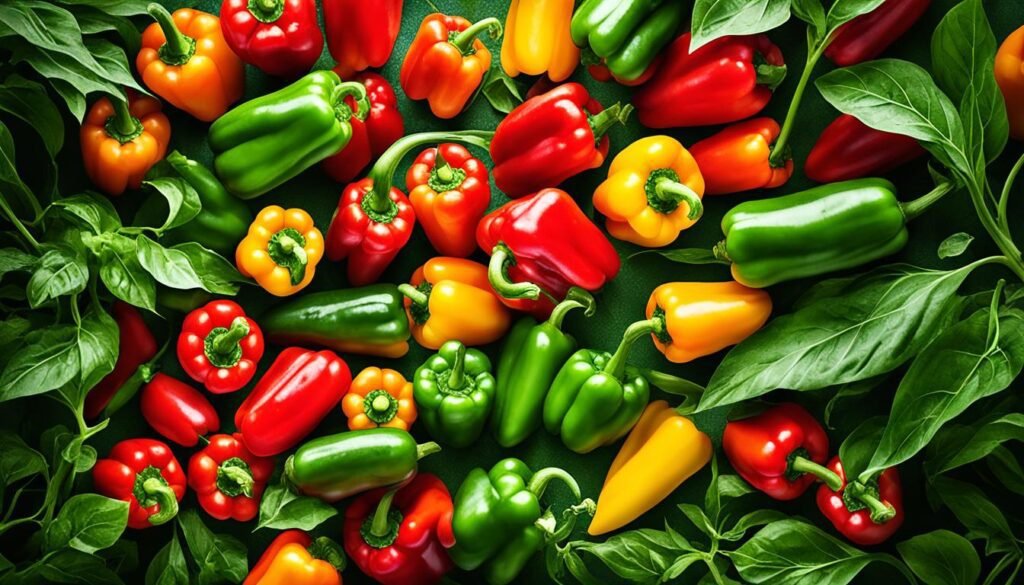
Incorporating red bell peppers into your diet can be a delicious way to promote skin health. These vibrant vegetables are not only visually appealing with their bright colors but also packed with antioxidants that offer numerous benefits for your skin.
The antioxidants found in red bell peppers are known for their anti-inflammatory properties, helping to combat oxidative stress and protect your skin from damage caused by free radicals. By reducing inflammation, these antioxidants contribute to a healthier complexion.
One of the key factors behind the skin benefits of red bell peppers is the presence of carotenoids, which are responsible for their vibrant colors. Carotenoids, such as beta-carotene and lycopene, have been linked to improved skin health and a reduction in signs of aging.
| Nutrient | Amount per 100g |
|---|---|
| Vitamin C | 127.7mg |
| Vitamin A | 2631IU |
| Carotenoids | Carotenoids include beta-carotene, lycopene, and beta-cryptoxanthin |
| Other Antioxidants | Including vitamin E and vitamin B6 |
As shown in the table above, red bell peppers are an excellent source of vitamin C, providing over 100% of the recommended daily intake per 100 grams. Vitamin C is essential for collagen synthesis, which is crucial for maintaining the elasticity and structure of your skin.
The abundance of antioxidants and anti-inflammatory properties found in red bell peppers makes them a valuable addition to any skin-friendly diet. Whether enjoyed raw in salads or cooked in stir-fries, red bell peppers can contribute to your overall skin health and give you that radiant glow.
Eating a diet rich in antioxidants, like those found in red bell peppers, can help protect your skin and promote a healthy complexion.
Spinach: Hydrating and Antioxidant-Rich Leafy Green
When it comes to supporting my skin health, spinach is a leafy green that never disappoints. Not only is it incredibly hydrating, but it’s also packed with antioxidants that are crucial for maintaining a youthful appearance. Spinach is a nutritional powerhouse, providing key vitamins and minerals that promote skin rejuvenation and overall well-being.
Antioxidant-Rich Goodness
Spinach is loaded with a wide range of antioxidants that help protect my skin from oxidative stress, one of the main factors contributing to aging. These antioxidants, such as vitamins A, C, E, and K, neutralize free radicals and reduce inflammation, keeping my skin looking radiant and healthy.
Promoting Collagen Production
Collagen is essential for maintaining skin elasticity and preventing the formation of wrinkles. Luckily, spinach plays a vital role in collagen production due to its high vitamin C content. This vitamin acts as a building block for collagen synthesis, helping to keep my skin firm and supple.
The Magic of Vitamins
In addition to its antioxidant and collagen-boosting properties, spinach is a fantastic source of various vitamins that support skin health. Here’s a breakdown of the key vitamins found in spinach:
| Vitamins | Benefits |
|---|---|
| Vitamin A | Protects against UV damage, maintains healthy skin cells |
| Vitamin C | Boosts collagen production, brightens complexion |
| Vitamin E | Helps repair and protect skin cells, reduces inflammation |
| Vitamin K | Aids in blood clotting and supports overall skin health |
These vitamins work together synergistically to nourish my skin from within and promote a youthful glow.
Improving Eye Health
Did you know that spinach is also beneficial for maintaining healthy eyes? It contains lutein, a carotenoid that acts as an antioxidant and protects against age-related macular degeneration. By incorporating spinach into my diet, I can support not only my skin but also my vision.
Potential Cancer Prevention
Spinach contains a range of compounds, including flavonoids and carotenoids, which have been associated with a reduced risk of cancer. These powerful antioxidants help neutralize harmful free radicals that can damage DNA and contribute to the development of cancer cells.
With all its incredible benefits, I make sure to include spinach in my meals regularly. Whether it’s in a refreshing salad, a nourishing smoothie, or cooked as a delicious side dish, spinach is a versatile and nutrient-packed addition to any diet.
Sweet Potatoes: Boosting Skin Elasticity and Health
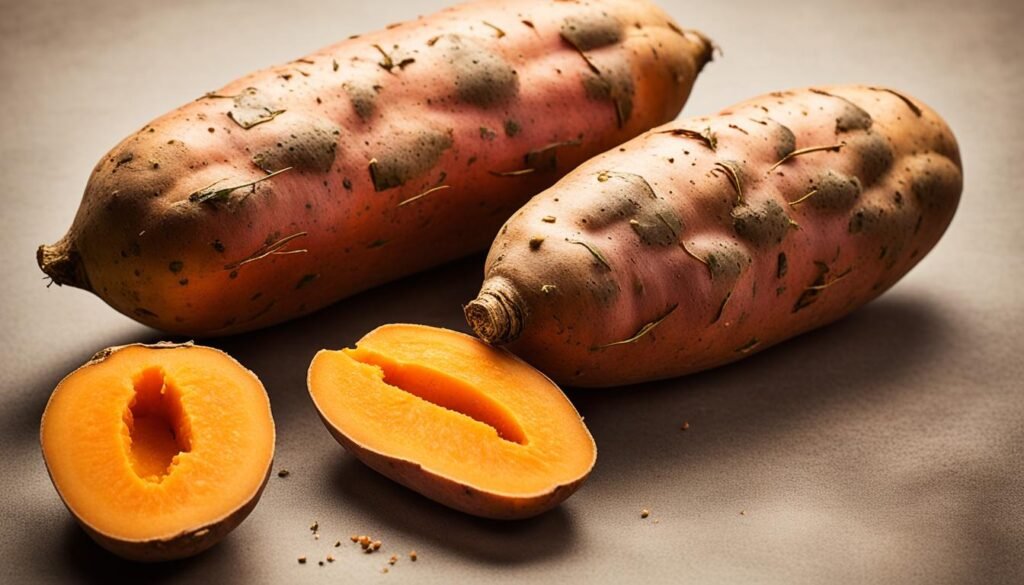
Sweet potatoes are a delicious and nutritious root vegetable that offers numerous benefits for the skin. Rich in beta-carotene, sweet potatoes are converted to vitamin A in the body, which plays a crucial role in promoting skin elasticity and cell turnover. Vitamin A helps in the formation of collagen, a protein responsible for maintaining the skin’s structure and firmness.
Additionally, sweet potatoes are packed with vitamins C and E, which are potent antioxidants that protect the skin from damage caused by free radicals. Vitamin C aids in the production of collagen, promoting the skin’s strength and resilience. Vitamin E, on the other hand, helps maintain the skin’s moisture levels and supports overall skin health.
Enjoying sweet potatoes in various recipes is a great way to incorporate these skin-boosting nutrients into your diet. Whether roasted, mashed, or added to salads, they provide a delicious and versatile addition to your meals.
Discover the benefits of sweet potatoes for your skin:
“Sweet potatoes are a natural source of beta-carotene, which the body converts into vitamin A. This vitamin is crucial for promoting skin elasticity and cell turnover, resulting in smoother, more youthful-looking skin.”
The skin-boosting nutrients found in sweet potatoes:
| Nutrient | Benefits for Skin |
|---|---|
| Beta-carotene | Promotes skin elasticity and cell turnover |
| Vitamin C | Supports collagen production and protects against oxidative stress |
| Vitamin E | Moisturizes the skin and maintains its overall health |
The combination of beta-carotene, vitamins C and E make sweet potatoes a valuable addition to your skincare routine, nourishing your skin from within and enhancing its natural radiance.
Embrace the benefits of sweet potatoes and savor their delicious flavor while giving your skin a healthy boost!
Watercress: Nutrient-Dense Green for Skin and Overall Health
Watercress is a powerhouse leafy green that offers numerous benefits to both skin and overall health. It is a nutrient-dense vegetable that supports the immune system, aids in digestion, and promotes the health of the eyes and heart.
One of the key advantages of watercress is its high content of antioxidants, which help protect the body against free radicals and oxidative stress. Antioxidants are essential for maintaining healthy skin, as they combat the damaging effects of environmental factors and promote skin rejuvenation.
Watercress is also a rich source of vitamins A, C, K, B1, and B2. These vitamins play vital roles in supporting various bodily functions, including immune system function and collagen production. Vitamin A helps promote healthy skin cell turnover, while vitamins C and E aid in collagen synthesis, which is important for maintaining skin elasticity and reducing skin aging signs.
Additionally, watercress is packed with minerals such as calcium, potassium, manganese, and phosphorus. These minerals contribute to bone health, heart function, and skin nourishment.
| Nutrients | Amount per 100g |
|---|---|
| Vitamin A | 212% of daily recommended intake |
| Vitamin C | 72% of daily recommended intake |
| Vitamin K | 238% of daily recommended intake |
| Vitamin B1 (Thiamin) | 8% of daily recommended intake |
| Vitamin B2 (Riboflavin) | 10% of daily recommended intake |
| Calcium | 12% of daily recommended intake |
| Potassium | 12% of daily recommended intake |
| Manganese | 9% of daily recommended intake |
| Phosphorus | 8% of daily recommended intake |
Watercress can be easily incorporated into your diet by adding it to salads or using it as a garnish for various dishes. Its peppery flavor adds a refreshing twist to meals and complements other ingredients well.
Including watercress in your regular diet can help improve your skin’s health and contribute to your overall well-being. Its abundance of antioxidants, vitamins, and minerals make watercress a valuable addition to a skin-friendly diet.
Avocado: Healthy Fats for Skin Health
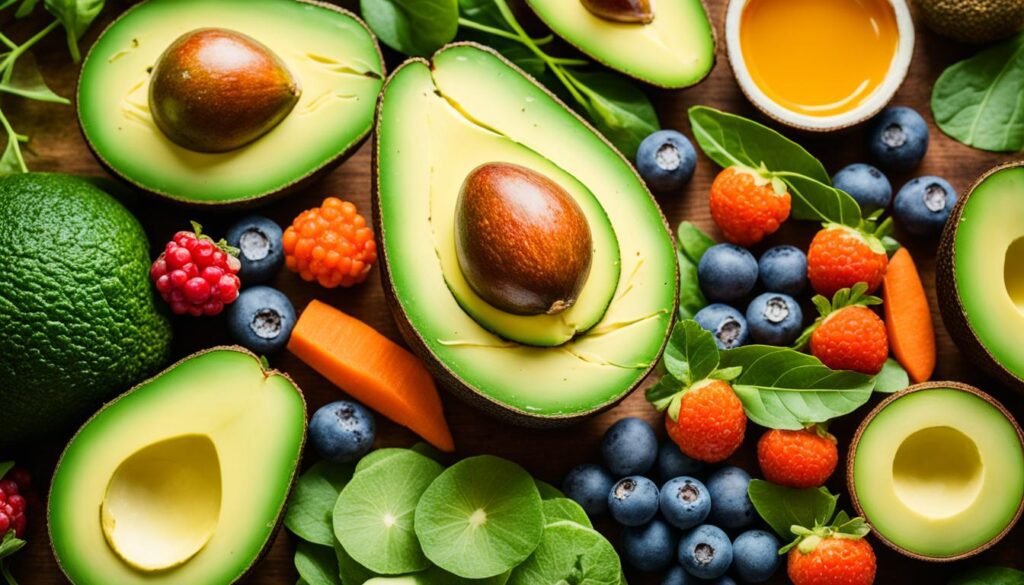
When it comes to promoting skin health, avocados are a true powerhouse. These creamy fruits are not only delicious but also packed with inflammation-fighting fatty acids that can provide numerous benefits for your skin.
Avocados are rich in vitamins and minerals that contribute to skin health. They contain vitamins K, C, E, and A, which are well-known for their antioxidant properties. These vitamins help protect the skin from damaging free radicals and promote a youthful glow.
In addition to antioxidants, avocados are a great source of B vitamins like folate, which aids in cell regeneration and supports overall skin health. They also contain potassium, a mineral that helps maintain the skin’s moisture balance and promotes hydration.
One of the key benefits of avocados for skin health is their high content of healthy fats, such as monounsaturated and polyunsaturated fats. These fats help keep the skin well-nourished and moisturized, reducing dryness and promoting a soft, supple complexion.
With all these skin-loving nutrients, incorporating avocados into your diet is a great way to enhance your skin health. Avocado can be enjoyed in various ways, such as adding slices to salads, spreading mashed avocado on toast, or blending it into a creamy smoothie.
Whether you choose to consume avocados plain or as part of a recipe, adding this nutritious fruit to your daily routine can have a positive impact on your skin. The combination of inflammation-fighting fatty acids, vitamins K, C, E, and A, B vitamins, and potassium make avocados a must-have ingredient for a skin-friendly diet.
Blueberries: Antioxidant-Rich Fruit for Skin Protection
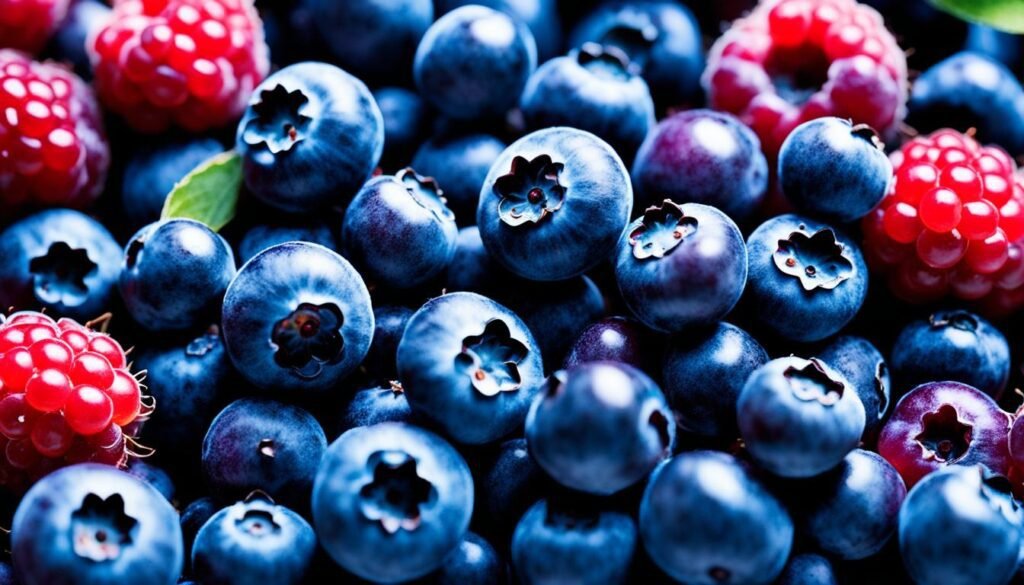
When it comes to skincare, blueberries are an underrated gem. These small, juicy berries are packed with antioxidants, making them a powerful ally in protecting your skin from damage caused by free radicals and sun exposure.
The antioxidants found in blueberries, particularly vitamins A and C, help to neutralize harmful free radicals and reduce the oxidative stress on your skin. Vitamin A aids in repairing damaged skin cells and promoting overall skin health, while vitamin C supports collagen production, essential for maintaining skin elasticity and reducing the appearance of fine lines and wrinkles.
Additionally, blueberries have been shown to shield the skin against the harmful effects of the sun’s UV rays. The high concentration of antioxidants in blueberries acts as a natural defense mechanism, helping to fight against sun-induced skin damage.
One easy way to incorporate blueberries into your diet is by adding them to smoothies or using them as a delicious topping for your morning breakfast bowls. Their sweet and tangy flavors make them a versatile and enjoyable addition to any meal or snack.
Benefits of Blueberries for Skin Protection:
- Rich in antioxidants, including vitamins A and C
- Help protect the skin from sun damage
- Support collagen production, reducing collagen loss and promoting skin elasticity
While blueberries alone cannot reverse the signs of aging or prevent all skin damage, they can be a valuable addition to your skincare routine. Including blueberries in your diet can provide your body with the necessary nutrients to support skin health, protect against sun damage, and reduce collagen loss.
Enjoy the delicious taste of blueberries while giving your skin the added protection it deserves.
| Vitamins and Nutrients Found in Blueberries: | Benefits for Skin: |
|---|---|
| Vitamin A | Repairs damaged skin cells |
| Vitamin C | Promotes collagen production |
| Antioxidants | Neutralizes free radicals, reduces oxidative stress |
Eating a variety of antioxidant-rich foods, like blueberries, as part of a healthy and balanced diet is key to maintaining youthful, glowing skin. So, next time you’re at the grocery store, don’t forget to pick up a pint of these antioxidant powerhouses!
Papaya: Superfood for Skin Rejuvenation
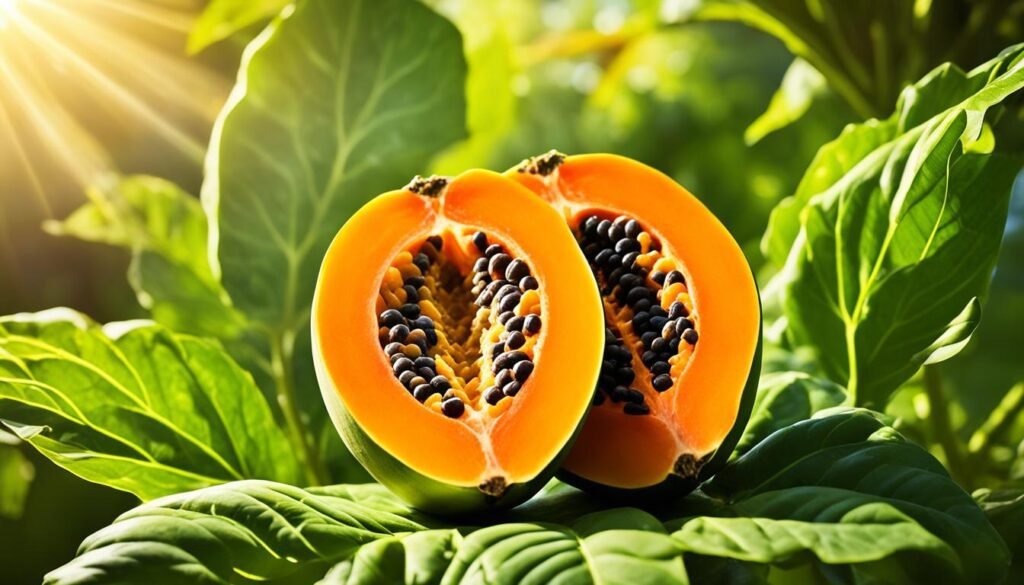
Papaya is a superfood that offers a multitude of benefits for skin rejuvenation. Rich in antioxidants, vitamins A, C, K, and E, as well as calcium, potassium, magnesium, phosphorus, and B vitamins, papaya provides a powerful nutritional boost for your skin.
Antioxidants play a crucial role in fighting against the damaging effects of free radicals, which contribute to premature aging and skin damage. The high levels of antioxidants in papaya help protect your skin from oxidative stress and promote a youthful complexion.
Vitamins A, C, K, and E found in papaya are essential for maintaining healthy skin. Vitamin A supports cell turnover and helps keep skin smooth, while vitamin C aids in collagen production, promoting firmness and elasticity. Vitamin K helps reduce the appearance of dark circles and bruises, while vitamin E acts as a moisturizer and protects against UV damage.
In addition to vitamins, papaya is a great source of essential minerals like calcium, potassium, and magnesium. These minerals are crucial for maintaining skin hydration, integrity, and overall health.
Papain, an enzyme present in papaya, is known for its digestive properties. It helps improve digestion, allowing your body to absorb nutrients more efficiently, which can have a positive impact on your skin’s appearance and health.
Whether enjoyed fresh or used in homemade masks, incorporating papaya into your skincare routine is an excellent way to promote skin rejuvenation and nourishment.
| Nutrient | Benefits for Skin |
|---|---|
| Antioxidants | Help protect against oxidative stress and premature aging |
| Vitamins A, C, K, E | Support collagen production, reduce the appearance of dark circles, moisturize, and protect against UV damage |
| Calcium | Promotes skin hydration and overall health |
| Potassium | Helps maintain skin integrity and hydration |
| Magnesium | Aids in skin health and supports overall well-being |
| Papain | Improves digestion and enhances nutrient absorption |
Conclusion
By nourishing ourselves with a natural diet rich in skin-healthy foods, we can promote healthy aging and support our overall well-being. Incorporating nutrient-dense foods like broccoli, red bell pepper, spinach, sweet potatoes, watercress, avocado, blueberries, and papaya into our diet can provide the necessary antioxidants, vitamins, and minerals needed for youthful, radiant skin. These anti-aging nutrition tips can help us maintain a healthy lifestyle while taking care of our skin.
While a natural diet is important for skin anti-aging, it’s essential to remember that it’s just one piece of the puzzle. Other lifestyle factors such as regular exercise, proper hydration, stress management, and adequate sleep all play a role in maintaining youthful skin. It’s also important to protect our skin from harmful UV rays by wearing sunscreen and practicing sun safety habits.
As we age, our skin goes through natural changes, and while these foods can support healthy aging, they won’t completely reverse wrinkles or other signs of aging. However, incorporating a natural diet filled with skin-healthy foods can contribute to a healthy, age-defying lifestyle. So start nourishing your body from the inside out and enjoy the benefits of youthful skin for years to come!
FAQ
Can diet help with skin anti-aging?
Yes, eating a natural diet that is rich in skin-healthy foods can help support skin anti-aging by providing antioxidants, vitamins, and minerals that promote healthy skin.
What are the best foods for skin rejuvenation?
Some of the best foods for skin rejuvenation include broccoli, red bell peppers, spinach, sweet potatoes, watercress, avocado, blueberries, and papaya.
How does broccoli support aging skin?
Broccoli is packed with vitamins C and K, antioxidants, and fiber, which support collagen production and promote brain and bone health.
What benefits do red bell peppers have for the skin?
Red bell peppers are rich in antioxidants and have anti-inflammatory properties that help protect the skin from oxidative stress and promote overall skin health.
How does spinach contribute to skin health?
Spinach is hydrating and packed with antioxidants, vitamins A, C, E, and K, and minerals like magnesium and iron, which support collagen production, eye health, and may help prevent cancer.
What makes sweet potatoes beneficial for the skin?
Sweet potatoes are rich in beta-carotene, vitamins C and E, which promote skin elasticity and cell turnover, protecting the skin and promoting overall skin health.
How does watercress promote skin and overall health?
Watercress is a nutrient-dense leafy green that supports the immune system, aids digestion, and is packed with vitamins A, C, K, B1, B2, and minerals like calcium and potassium, promoting glowing skin and improved health.
How do avocados contribute to skin health?
Avocados are high in inflammation-fighting fatty acids, vitamins K, C, E, A, B vitamins, and potassium, which promote skin health and can be a great addition to any diet.
Do blueberries have any benefits for the skin?
Blueberries are rich in antioxidants, including vitamins A and C, which help protect the skin from sun damage and reduce collagen loss, however, more research is needed to fully understand their effects on skin aging.
How does papaya benefit skin rejuvenation?
Papaya is a superfood rich in antioxidants, vitamins A, C, K, E, calcium, potassium, magnesium, and B vitamins. It has a wide range of antioxidants and the enzyme papain, which improves digestion and promotes skin rejuvenation.
Can a natural diet contribute to healthy aging?
Absolutely! By nourishing ourselves with a natural diet rich in skin-healthy foods, we can promote healthy aging and support our overall well-being.

